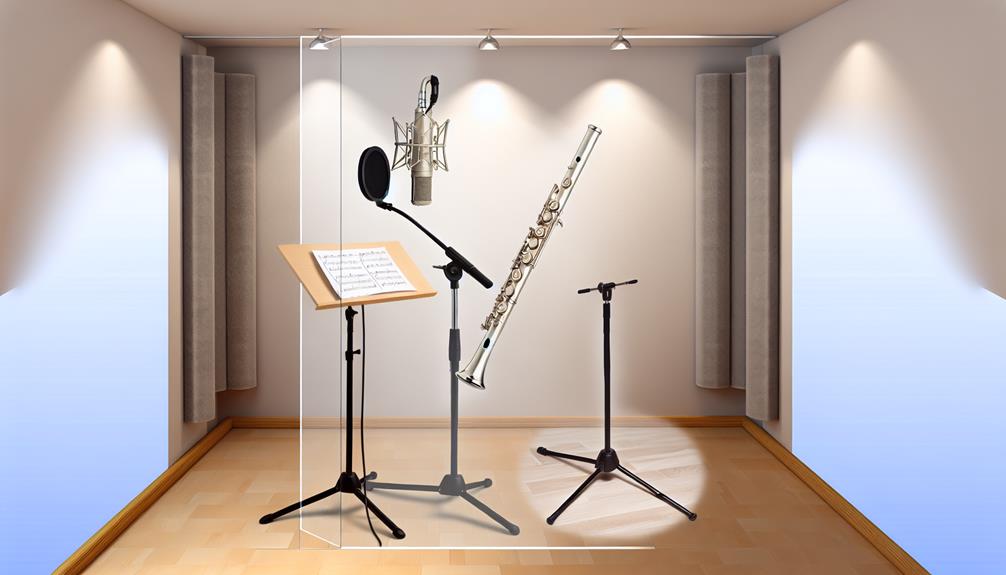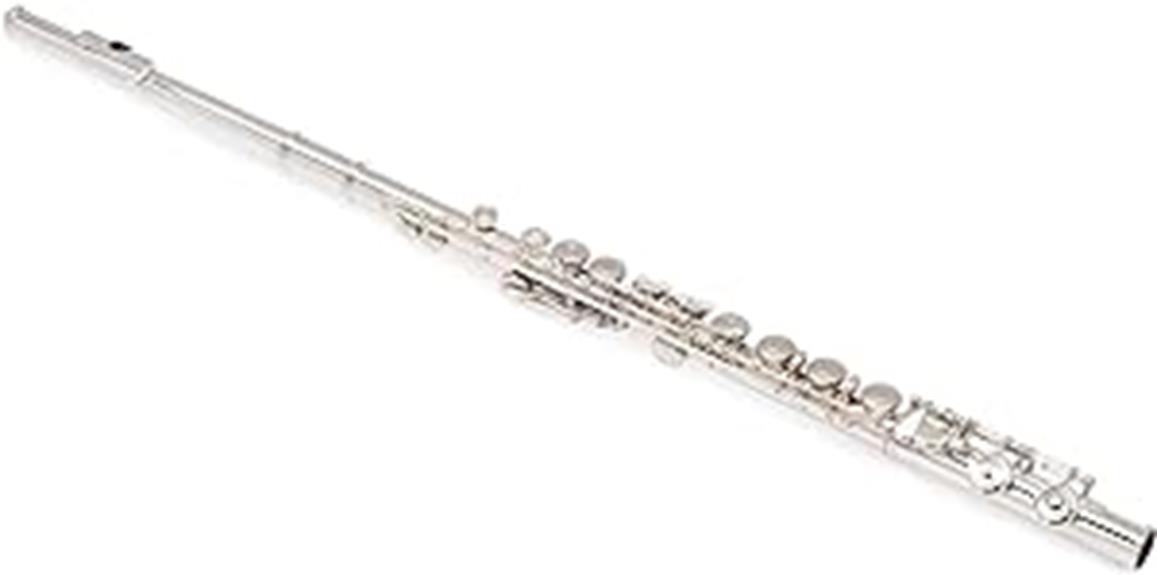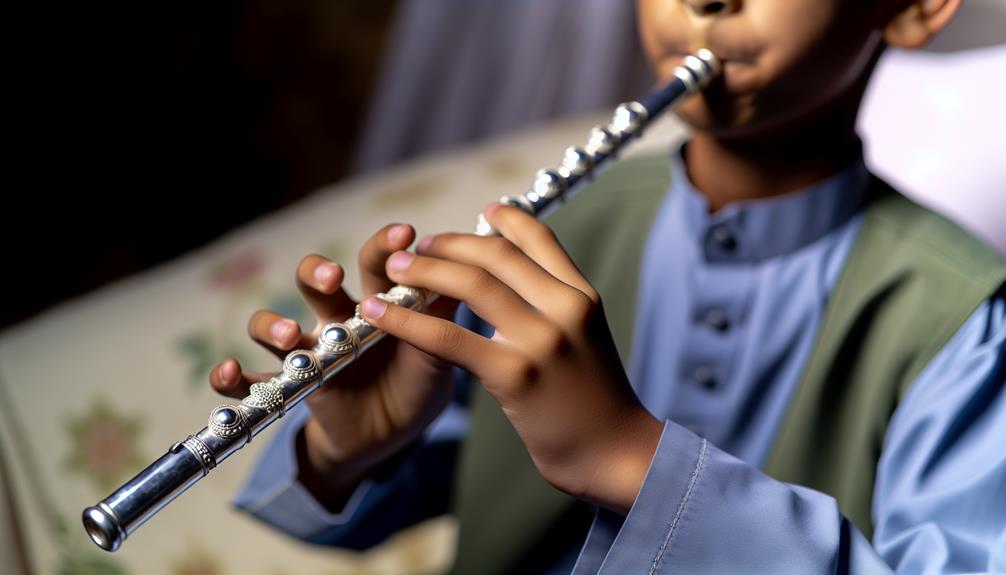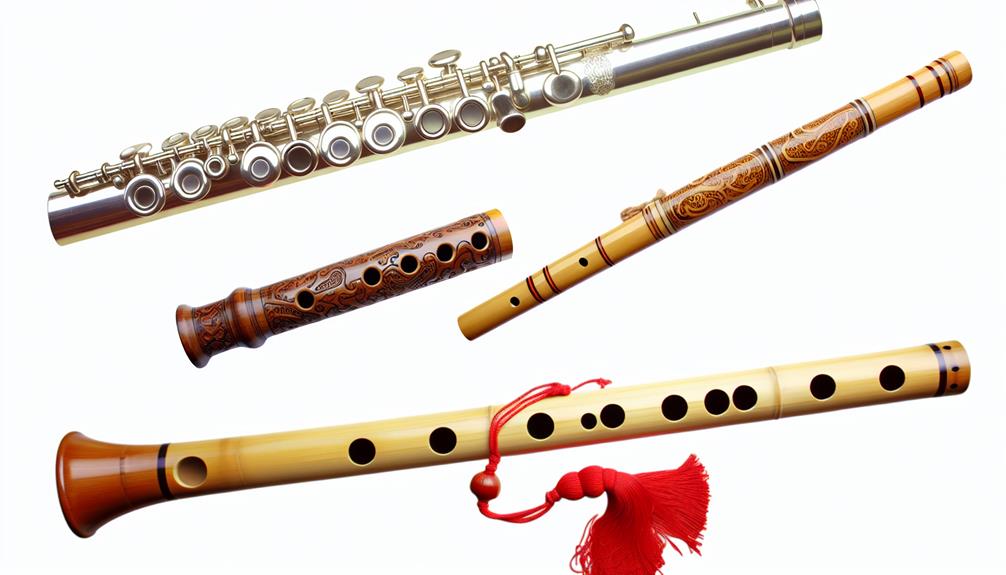When embarking on the journey of learning the flute, selecting the right instrument is crucial for a smooth and enjoyable learning experience.
With a myriad of options available in the market, beginners often find themselves pondering over which flute would best suit their needs.
Factors such as the material, key system, and brand play significant roles in determining the ideal flute for a novice player.
By understanding these nuances and making an informed choice, beginners can set a strong foundation for their musical endeavors.
Key Takeaways
- Choose a flute type based on personal preferences and budget constraints.
- Consider material, key configuration, weight, and size when selecting a flute.
- Opt for reputable brands like Yamaha, Gemeinhardt, or Jupiter for quality instruments.
- Maintain your flute regularly with cleaning, swabbing, storage, and professional care for optimal performance.
Types of Flutes for Beginners
What are the different types of flutes suitable for beginners to start learning on?
For those just beginning their musical journey, it is essential to choose a flute that is not only easy to play but also conducive to learning and improvement.
The most common type of flute recommended for beginners is the standard silver-plated flute. This type of flute is versatile, widely available, and relatively affordable, making it a popular choice for new players.
Another option for beginners is the closed-hole flute, which is easier to handle and learn on compared to open-hole flutes. Closed-hole flutes are ideal for those who are still developing their finger strength and dexterity.
Additionally, beginner flutists may also consider a plastic flute as a cost-effective and durable alternative to traditional metal flutes. Plastic flutes are lightweight and resistant to temperature and moisture changes, making them suitable for young learners or those on a budget.
Ultimately, the best type of flute for beginners will depend on individual preferences, budget constraints, and long-term musical goals.
Factors to Consider When Choosing
When selecting a flute for beginners, it is crucial to consider various factors that can impact the learning experience and overall progress in mastering the instrument. To ensure the best choice for a beginner flutist, here are some key factors to consider:
- Material: Flutes can be made from different materials, such as nickel silver, silver-plated, or even solid silver. The material can affect the tone quality and durability of the instrument.
- Key Configuration: Flutes come in different key configurations, with the most common being the C flute. Consider the key configuration based on the music the beginner intends to play.
- Weight and Size: The weight and size of the flute can impact the comfort and ease of playing, especially for younger beginners or those with smaller hands.
- Budget: Set a budget range before looking for a flute to ensure that you find one that meets your needs without overspending.
Considering these factors will help in selecting a flute that is suitable for beginners and conducive to their musical journey.
Best Flute Brands for Beginners
Among the top recommendations for beginners looking to invest in a quality flute are reputable brands known for their craftsmanship and reliability. Yamaha is a popular choice for novice flutists due to its consistent quality and durability. The Yamaha YFL-222 and YFL-212 are often praised for their ease of playability and clear sound projection, making them ideal for those starting their musical journey.
Gemeinhardt is another trusted brand that offers a range of affordable beginner flutes without compromising on quality. The Gemeinhardt 2SP and 3OB models are frequently recommended for their reliable performance and excellent tone production.
Jupiter flutes are also well-regarded among beginners for their ergonomic design and smooth key action, providing a comfortable playing experience for new learners. When considering a flute purchase, it is essential to choose a brand with a reputation for producing instruments that are not only beginner-friendly but also built to last, ensuring a fulfilling musical experience for years to come.
Tips for Maintaining Your Flute
For flutists looking to maintain the longevity and performance of their instrument, implementing proper care and maintenance practices is essential. Here are some tips to help you keep your flute in top condition:
- Cleaning: Regularly clean your flute with a cleaning rod and cloth to remove moisture, dirt, and debris that can affect the sound and mechanism.
- Swabbing: After playing, swab out the moisture from the inside of the flute using a cleaning cloth to prevent build-up and corrosion.
- Storage: Store your flute in a protective case when not in use to shield it from dust, moisture, and accidental damage.
- Professional Maintenance: Schedule regular check-ups with a certified technician to ensure that your flute is in optimal playing condition and to address any issues promptly.
Resources for Beginner Flute Players
Beginner flute players can benefit greatly from accessing a variety of resources designed to enhance their learning and skill development. One valuable resource is private lessons with a qualified flute instructor. These one-on-one sessions provide personalized guidance, feedback, and support tailored to the individual player's needs, helping them progress efficiently.
Additionally, online tutorials and instructional videos offer a convenient way for beginners to learn at their own pace and practice specific techniques. Joining a local flute choir or ensemble can also be beneficial as it provides opportunities for players to collaborate with others, build camaraderie, and improve ensemble playing skills.
Furthermore, music books, sheet music, and online platforms like music forums and communities offer a wealth of knowledge, repertoire, and support for beginner flute players. By utilizing these resources, aspiring flutists can enhance their learning experience, develop their skills, and immerse themselves in a supportive community of fellow musicians.
Frequently Asked Questions
What Is the Best Age to Start Learning the Flute as a Beginner?
The best age to start learning the flute as a beginner is typically around 8 to 10 years old. At this age, children have developed enough physical coordination and cognitive abilities to begin learning an instrument effectively.
Are There Any Specific Exercises or Warm-Ups Recommended for Beginner Flute Players?
Embarking on the journey of flute playing as a novice warrants embracing foundational exercises and warm-ups. These rituals not only nurture technical proficiency but also cultivate a deep appreciation for the instrument's nuances, paving the way for musical growth.
Can a Beginner Learn to Play the Flute Without Taking Formal Lessons?
Learning to play the flute as a beginner without formal lessons is possible but challenging. Self-teaching may lead to improper techniques and hinder progress. Professional guidance ensures correct fundamentals, fosters good habits, and accelerates learning, enhancing overall musical development.
How Often Should a Beginner Clean Their Flute to Maintain Its Quality?
Regular maintenance is crucial to preserving a flute's quality. Beginners should aim to clean their instrument after each practice session to prevent buildup of dirt and moisture, ensuring optimal performance and longevity of the flute.
Are There Any Common Mistakes That Beginners Should Avoid When Starting to Play the Flute?
Embarking on the flute journey mirrors a delicate dance; avoid missteps by nurturing patience, embracing consistency, and seeking guidance. Evade the siren call of haste, as slow progress fosters enduring mastery.
Conclusion
In conclusion, when choosing a flute for beginners, it is important to consider the type of flute, the brand, and how to properly maintain it.
With resources available for beginner flute players, such as online tutorials and music teachers, one can embark on their musical journey with confidence.
Just as a masterful musician can create beautiful melodies with their flute, a beginner can also strive to reach new heights with dedication and practice.





